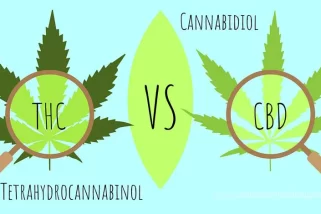In This Article
What is CBD?
CBD — also known as Cannabidiol, is one of the most studied compounds of the 80+ cannabinoids found in the industrial hemp plant [1]. But, what is CBD exactly? Because it is a natural compound of the hemp plant, it can comprise up to 40% of hemp.

Unlike THC, another popular compound found in the industrial hemp plant, CBD is non-intoxicating, which means that you will not experience a high with use. Oftentimes, CBD is regarded as the single most crucial cannabinoid ever discovered! With an increase of research and more and more people discovering its health benefits, it’s hard to avoid this powerful plant!
CBD can be added to pretty much every wellness product you can think of. Whether you are choosing to ingest CBD or apply it topically, you will surely experience benefits. Your body’s absorption of CBD into your bloodstream is referred to as its bioavailability. By maximizing bioavailability, you will allow more CBD to be readily available for use within your body [2].
Keep in mind, taking CBD through various methods changes its bioavailability, however, you should choose the methods that best support your body's needs.
What are the Health Benefits of CBD?
Recent years have proven that the popularity of CBD is here to stay. In fact, ongoing research has convinced most people that there is a health benefit to using CBD for them. As a safer, and federally legal alternative to marijuana, CBD has proven that it can be a key player in helping conditions such as anxiety, pain, inflammation, and more.
If you didn’t know already, everybody has an endocannabinoid system, which works with the natural cannabinoid receptors in your brain and immune system to fight pain, inflammation, and other things that could negatively impact your internal homeostasis. All the while, you maintain full control over your brain and its functions.
Some of the perceived benefits of CBD include:
- Depression and Anxiety Relief: Many medical researchers have found that CBD is able to reduce symptoms of these mental disorders [3].
- Reduce Pain: This benefit attracts most users. Depending on which method you take, it is likely that CBD can provide relief. For muscle soreness or Arthritis pain, try a muscle salve. If you suffer from an inflammatory disease, you may benefit from utilizing a CBD oil or tincture.
- Prevent Diabetes: Research shows that CBD may be able to help prevent a condition called insulitis, which is known to cause Type 1 Diabetes. If you are someone who already has diabetes, CBD may be able to help lower the side effects [4].
- Reduce Blood Pressure: When used regularly, CBD can help lower blood pressure, lessing the chance of a heart attack, stroke, or heart disease.
- Fight Insomnia: CBD is often praised for its ability to provide rest and relaxation for those that have a hard time falling and staying asleep.
- Reduces Disease Symptoms: Research has shown that CBD can help prevent and reduce neuroinflammation by shielding neurons from the free radicals that try to destroy them. This is especially important for those that are looking for relief of symptoms from Alzheimer's Disease [5].
Health and science professionals have committed to ongoing and extensive research regarding the benefits of CBD. As time goes on, results will surely prove the effectiveness of CBD.
CBD Dosage
In monkeys, CBD does not affect bodily functions or behavior unless the animals receive dosages higher than 30 mg/kg orally each day for 90 days or 150 mg/kg intravenously. The World Health Organization (WHO) reports that people usually tolerate CBD well. CBD does not cause a “high,” and it does not have the same potential for abuse as cannabis.
In a human physical dependence study, researchers gave people 1,500 mg per day of CBD for 4 weeks. The study participants did not go through withdrawal after the 28-day trial [6]. Another study found that doses up to 1,500 mg per day were well-tolerated [7].
Possible Side Effects of CBD
The data on the safety of CBD is limited. The data that are available point to possible risks that people must consider before taking CBD for any reason.
According to the FDA reports, some side effects of CBD [8] are noticeable, including:
- Changes in alertness (drowsiness or excessive sleepiness)
- Gastrointestinal distress (diarrhea and/or decreased appetite)
- Changes in mood (irritability and agitation)
Other side effects can happen without people being aware of the cause, such as:
- cause liver injury
- interactions with other medications
- injuries that result from mixing alcohol or other depressants and CBD
Is CBD Safe?
This question is common and rightfully so. A simple Google search of this question may lead you down a rabbit hole.
Simply put, do your research. With a seemingly sudden increase in popularity, there are tons of options when it comes to purchasing CBD. We encourage you to do your own research and find a brand that is reputable that you can trust. You will want to look for brands that offer information about how their hemp is grown, sourced, and extracted. Additionally, it is helpful when brands share their Certificate of Analysis (COA). On this document, you will find the amount of CBD in each product — be sure to double-check that what it says is also on the bottle [9].
As always, anytime you are implementing a new product or supplement, it is best to check with your doctor or trusted health professional before trying something new!
9 Sources
We review published medical research in respected scientific journals to arrive at our conclusions about a product or health topic. This ensures the highest standard of scientific accuracy.
[2] Bioavailability: https://en.wikipedia.org/wiki/Bioavailability
[3] Can CBD Help with My Anxiety and Depression?: https://adaa.org/understanding-anxiety/cbd
[4] Cannabidiol lowers incidence of diabetes in non-obese diabetic mice: https://pubmed.ncbi.nlm.nih.gov/16698671/
[5] Cannabinoids as novel anti-inflammatory drugs: https://www.ncbi.nlm.nih.gov/pmc/articles/PMC2828614/
[6] EPIDIOLEX- cannabidiol solution: https://dailymed.nlm.nih.gov/dailymed/drugInfo.cfm?setid=8bf27097-4870-43fb-94f0-f3d0871d1eec#section-9
[7] Safety and side effects of cannabidiol, a Cannabis sativa constituent: https://pubmed.ncbi.nlm.nih.gov/22129319/
[8] What You Need to Know (And What We’re Working to Find Out) About Products Containing Cannabis or Cannabis-derived Compounds, Including CBD: https://www.fda.gov/consumers/consumer-updates/what-you-need-know-and-what-were-working-find-out-about-products-containing-cannabis-or-cannabis
[9] Certificate of Analysis definition: https://www.lawinsider.com/dictionary/certificate-of-analysis






 This article changed my life!
This article changed my life! This article was informative.
This article was informative. I have a medical question.
I have a medical question.
 This article contains incorrect information.
This article contains incorrect information. This article doesn’t have the information I’m looking for.
This article doesn’t have the information I’m looking for.